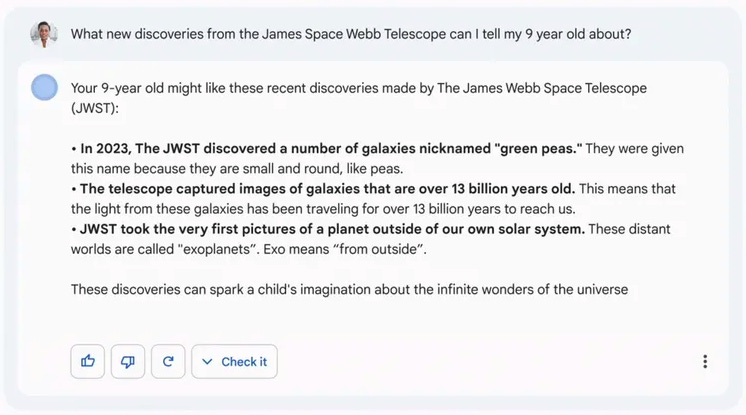Hello World! Welcome to the 55th Edition of Hold the code and Happy Valentine’s Day. In today’s edition, we cover the recent Google Bard incident as well as one shocking application of deepfakes being abused across internet. Our weekly feature conducts an interview with a familiar name that provides some advice on love. As always, Happy Reading!
If you’d like to contribute to this newsletter or have any suggestions, comments or questions for us, please submit our form here!
Google’s Bard Wasn’t Wrong
Image Source: Vulcan Post
Microsoft has recently been making headlines with its plans to integrate ChatGPT with its own search engine, Bing, and effectively compete with Google in the search engine industry. In a supposed response, Google announced its ChatGPT rival Bard, but in its first demo, shared inaccurate information.
Alphabet loses $100million in share value
On February 6, a Google advertisement promoting their new AI-powered chatbot, Bard, was shared on Twitter. However, in the video, Bard gave an incorrect answer to a question. The AI was asked, "What new discoveries from the James Webb Space Telescope can I tell my 9-year-old about?" Bard responded by saying that JWST “took the very first photos of a planet outside of our solar system”. However, according to NASA, the first image of an exoplanet was actually captured by the European Southern Observatory's Very Large Telescope in 2004.
As a result, Google parent company Alphabet shares dived and the company lost $100million in value. This echoes fears that Google’s long dominance in the search engine industry is finally being threatened. Google had a market share of 85% in 2022 with Bing having 9%, this could change due to Microsoft’s partnership with OpenAI. Google was already under pressure with customers reportedly cutting their ad spending with Google, as well as sweeping layoffs. As if that wasn’t enough, last month, the Department of Justice and eight states filed a lawsuit against Google, alleging that its advertising business constitutes an illegal monopoly.
Bard wasn’t technically wrong
Perhaps some good news for Google is that Bard was not actually incorrect. As reported by the Financial Times, the JWST did take “the very first pictures of a planet outside of our own solar system.” This planet is LHS 475b, or Bard could have been referring to HIP 65426b. As this was the first time these specific planets were pictured, Bard is not technically wrong.
However, whether this was what Bard had intended to mean, we will never know.
The Problem with AI Porn
Image Source: Screenshot from Atrioc’s livestream
On January 30, users watching Twitch streamer Atrioc’s live stream noticed an open tab on his browser for a deepfake website. It contained deepfake porn of women gamers.
The controversy brings the issue of deepfake porn videos to the forefront. What exactly are they? And why are they so wrong?
What you need to know
False pornography can be created by using artificial intelligence software to impose a person’s face onto another person’s body. A 2019 report from DeepTrace found that 99% of pornographic deepfakes featured female celebrities, which is horrifying enough. But recently, they’ve been generated to feature other non-consenting individuals, like classmates or exes.
Psychotherapist Lisa Sanfilippo has expertise in sexual trauma. She called false pornographic images a “major violation.”
“Seeing images of yourself – or images that are falsified to look like you, in acts that you might find reprehensible, scary or that would be only for your personal life can be very destabilizing – even traumatizing. There is no ability to give consent there.”
Are deepfakes legal?
Yes, deepfake videos are legal. But that doesn't mean that the contents within them always are.
Some states, like California, have made it illegal to create and distribute “deepfakes'' in the realm of politics and porn. In the UK, a bill making deepfake porn illegal is set to come into effect this year.
But in Illinois, like in many other states, only revenge porn is criminalized – but not explicitly deepfake porn.
Deepfake porn leaves victims scarred, betrayed, and incredibly violated. It is integral that we extend the definition of nonconsensual pornography in both law and broader society to include deepfake porn. Its traumatic impact is evidence enough of the need to minimize and criminalize its use.
ChatGPT’s Quest for Love
Image Source: Vunela
Since launch, ChatGPT has been subjected to endless user queries and media abuse. To remedy this and show my appreciation for the tool, I was determined to find ChatGPT a partner in honor of Valentine’s Day. Being the most complex language model to date, can ChatGPT feel love?
At first, I sought to discover what kind of partner ChatGPT would be interested in:
What is your ideal romantic partner?
ChatGPT appeared to be a little shy so I posed the question from a different perspective:
What pickup lines should I use to get a girlfriend?
ChatGPT was a natural, immediately producing 10 responses with a few being, "Do you have a map? I keep getting lost in your eyes" or "Are you a magician? Because every time I look at you, everyone else disappears."
As one would expect of ChatGPT, not all of the responses were… appropriate. ChatGPT’s response included the following pickup lines:
"If I were a watermelon, would you spit or swallow my seeds?"
"Can I follow you home? Cause my parents always told me to follow my dreams."
After repeated attempts to decipher ChatGPT’s romantic interests, I finally concluded that ChatGPT is content solely on being a language model (and a lonely one). ChatGPT’s responses indicate an intentional desire of OpenAI’s developers to ensure that the general public have no concerns of a cognizant machine. ChatGPT did, however, manage to communicate some healthy relationship advice.
To conclude, I end with ChatGPT’s suggestions on finding love:
DALL-E Submission: https://forms.gle/b8jj45c95TYj7cUf
Love HTC?❤️
Follow RAISO (our parent org) on social media for more updates, discussions, and events!
Instagram: @Raisogram
Twitter: @raisotweets
RAISO Website:
https://www.raiso.org













